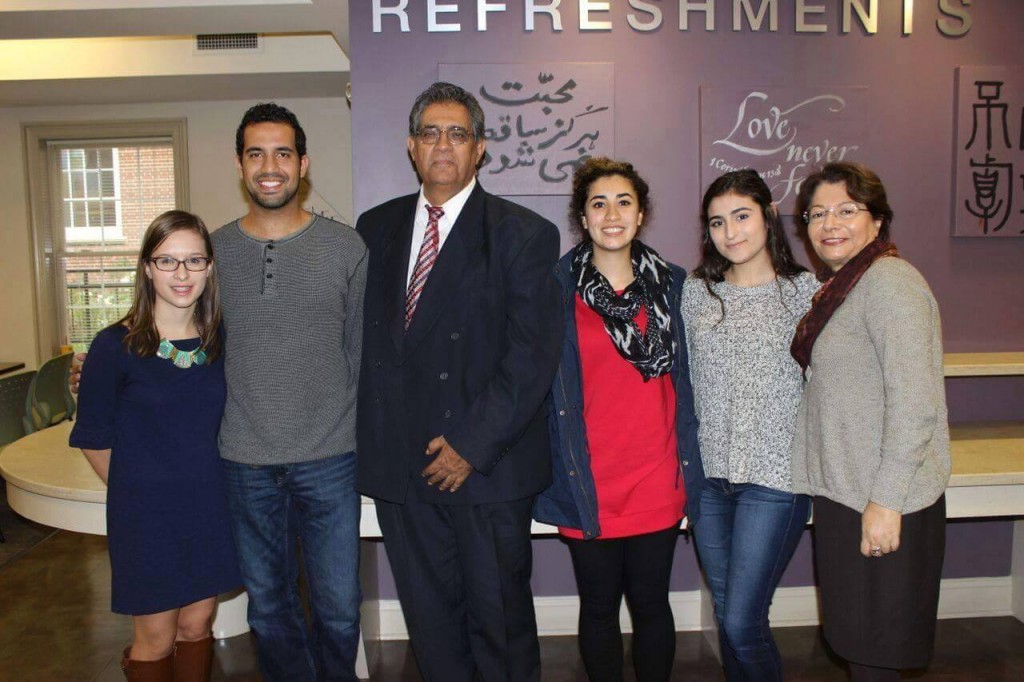Access the Video on WarpWire (must have DukeID to Login)
We first interviewed Babak, Noushin, and Mr. X (name omitted to protect privacy) who are all Baha’i refugees. Babak and Noushin (husband and wife) left Iran several years after the Revolution of 1979, and were able to use their passports to get out of the country. Mr. X and his family were forced to flee immediately after the revolution and had to leave using forged passports. They fled first to Pakistan, traveling in brutal conditions with little food or water, then to Spain, before finally arriving in the U.S. Discrimination against people of the Baha’i faith has unfortunately been entrenched in Iran for many years, present during the reign of the Shah and worsening after the Islamic Revolution. Noushin recalled instances of being shunned by children at her school, not being allowed to enter university, and even her house set on fire once. Babak described the lack of any respect towards Baha’is (“less respected than a dog”) and the difficulties of employment—government work is barred to Bahai’s in addition to owning any businesses dealing with food, lest they “pollute” it. Mr. X described horrific incidents of brutality against Baha’is, including systematic killings, throwing people from mountains or burning them alive in cars.
The second interview was with Mr. Assad, a Christian minister at a church in North Carolina. He had been arrested and jailed in Iran due to political activities and fled for his own safety after being “released” from prison. Like Mr. X’s family, he fled to the U.S. through Pakistan and then Europe. He described the horrific conditions he endured in jail and the severe torture inflicted against him. One method of intense psychological intimidation involved blindfolding several prisoners and gathering them in a room, systematically shooting and executing a handful while leaving those they wanted more information from alive. Physical torture was also a common tactic; the prison guards and interrogators would spit on the prisoners, slap them, beat them, and tie their hands up over their heads and to their feet. Solitary confinement was used as well, with the goal of forcing the prisoners to confess to certain crimes, regardless of whether they had actually committed them or not. Because Mr. Assad converted to Christianity while in the states, this also prevents him from returning to Iran.

From left to right: Katie Cottam, Borna Kassiri, Mr. Assad, Parmida Mostafavi, Nina Hatami, Fattaneh Vali Naeymi-Rad.
Finally, we interviewed Ali, a young man who had left Iran for a variety of reasons, most of them related to the social constraints. At his 15th birthday party, the special police stormed in and arrested everybody for partaking in “un-Islamic activities,” an event that drastically reduced his respect and regard for the regime. His future in Iran would also have been limited; he was gifted enough in football to be invited to the junior National Team but because he did not have any religious connections that could act as references (a prerequisite that was impossible after the birthday party incident), he was not able to join. Ali had a narrow window of opportunity in which to leave Iran, since once he graduated from high school he would have been conscripted into the army. Thus, he left with his father three months before graduation, staying in Europe for a few months before arriving in the U.S., seeking political asylum. He mentioned the huge risk people holding and attending parties in Iran took, relaying stories of instances when the police would come in and in order to escape, people would try to jump across buildings or jump down floors only to fall to their deaths. In some cases, someone might be hanging from a ledge and the police would come and just kick at them until they fell.
All expressed wishes to return, either for visiting or for living, but until the human rights situation in Iran improves, this remains an impossibility for the five interviewees.

